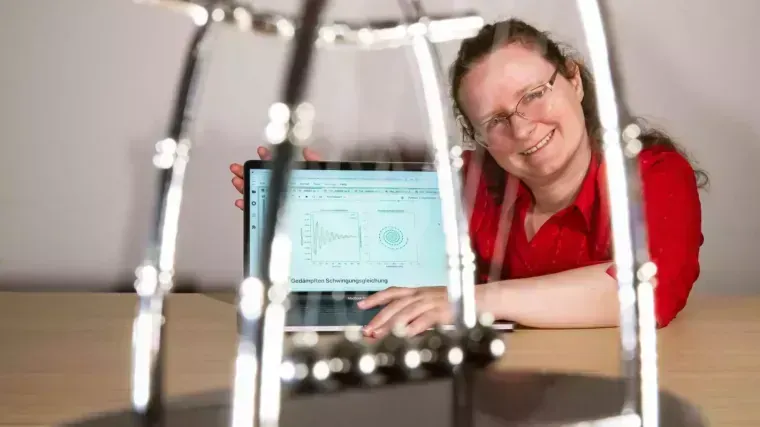
- Light
Published: | By: Stephan Laudien, English translation by Gleb Chupakhin
Read the original article here (in German) de
Physicist and ACP principal scientist PD Dr. Christin David has been awarded a fellowship this year as part of the "Fellowships for Innovations in Digital Higher Education" program. These scholarships are granted by the Thuringian Ministry of Science in collaboration with the Stifterverband (Association of Donors). Over the course of 15 months, Christin David aims to develop illustrative numerical experiments. Her target audience includes first-year students in Science, Technology, Engineering and Medicine (STEM) subjects, especially those studying for teaching degrees.
Mathematics Permeates All Disciplines
Together with her colleagues, Christin David creates virtual experimental setups that represent real phenomena. Students are expected to translate the setup into a formula with variable parameters and learn to actively develop programs that translate such formulas into computer code. "Our goal is to develop new teaching methods and generally to provide new impulses in education," says Christin David. However, it is always in mind that “We are not re-inventing the wheel. We are rather searching for suitable examples to vividly convey knowledge.” New approaches in the natural sciences have the potential to broaden horizons and enable a deeper understanding of relationships. Much of this revolves around mathematics. Regardless of the field, mathematics permeates all disciplines in the natural sciences and many beyond. In medicine, for example, it is possible to calculate how quickly the body metabolizes alcohol, while chemistry involves equilibria in reactions, according to Christin David. In physics, there is the "full broadside" of mathematics. Ultimately, students are taught how mathematics and reality are interconnected. Future schoolteachers should impart this perspective on the natural sciences in schools.
Supporting Critical Thinking
Christin David's fellowship begins in the winter semester. Initially, numerical experiments will be developed that are planned to be tested in practical application in the following summer semester. The goal is to create a series of lessons that build on each other. Christin David is still looking for collaborators for her team, and her dream candidates are curious education students. "There are opportunities for a thesis in subject didactics," she says. The numerical experiments serve as supplementary offerings for self-study, lectures, or seminars, aiming to empower students to question the fundamental aspects of an observation and apply appropriate analytical methods. This promotes the critical thinking of aspiring scientists and strengthens skills that are crucial in their future professional lives.